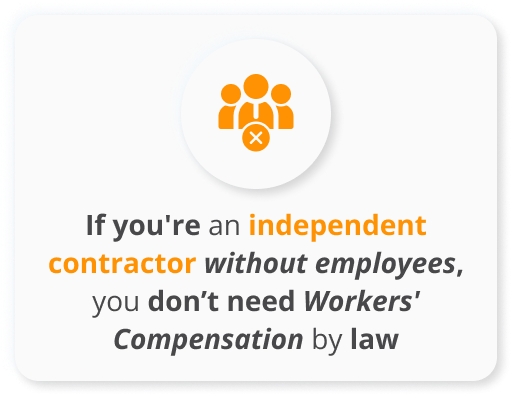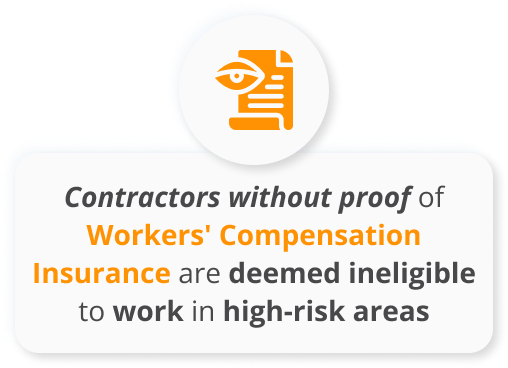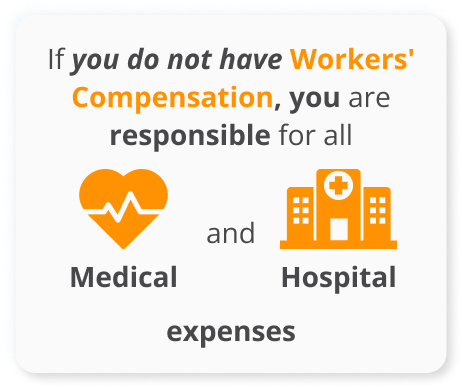What Is Worker’s Compensation Insurance?
Did you know that the market size of the worker’s compensation insurance industry is estimated at $48.3 billion during the current year, and is expected to reach 3% higher than the previous year?
Workers’ compensation insurance is a policy that safeguards you and your employees from work-related injuries or illness by covering medical expenses, lost wages, and other similar costs.

Businesses in every state require this policy if they have one or more employees working in the area of risk-intensive jobs. On the other hand, small business owners who work for themselves and do not have hired any employees are exempt from purchasing workers’ comp insurance.
In this article, we will review workers’ comp insurance, what its benefits are, any state-specific requirements, and any exclusions related to its policies.
Do You Need Workers’ Compensation Insurance For Your Business with Zero Employees?
If you are an independent contractor and wondering whether you need workers’ compensation insurance with no full-time or leased employees working for your business, you’ve come to the right place!

The simple and straight answer is no! You do not require to be covered with workers’ comp insurance when you don’t have any employees. However, having insurance may bring you a number of benefits that are discussed in the later section of the article.
Do States Require Workers’ Comp Insurance?
Workers’ compensation law varies by state. Usually, businesses that have one or more employees are entitled to purchase the policy. Generally, independent general contractors and self-employed individuals who do not have employees working under them are not required to buy worker’s comp insurance.
If you hire subcontractors, you must purchase a worker’s comp policy, as it is legally required as per all states’ laws.

Small business owners, independent contractors, sole-proprietors with no employees can purchase a worker’s compensation policy for self-insurance to cover medical expenses and lost wages in the incident of a work injury.
In many states, it’s a prerequisite for acquiring a general contractor’s license for many professionals who are looking to work in construction, demolition, repair, and maintenance projects.
State-specific Exemptions
General contractors and small business owners in all states except Texas must have workers’ comp insurance for employees. Each state has its own set of exemptions as per state laws, so you must check the insurance requirements in your state.

If you are a small business, LLC, independent contractor, or a sole-proprietor, you are not required to have worker’s comp coverage as per the law. However, you may be required to have coverage before you sign a contract for your next project with the construction client.
In many states, insurance carriers also cover employer’s liability insurance benefits that protect the business owners against lawsuits filed by employees for not preventing workplace injury. In this case, it covers court costs, attorney’s fees, settlements and judgment costs, and similar expenses.
Independent Contractors and Workers’ Comp Insurance
If you are an independent contractor with no employees, it’s not mandatory for you to get workers’ comp insurance coverage by law. If you have a number of employees working in your small business setup, you are required to have covered.

However, comp coverage might be required for self-employed or independent contractors to get a project in high-risk jobs such as construction, demolition, and similar work areas.
Simply put, a workers’ comp certificate of insurance can help you acquire required licenses and competitive projects as it ensures you have coverage against work-related injuries.
Workers’ compensation insurance cost is based on location, payroll, coverage limits, the number of employees, claims history, risk mitigation, and other similar factors.
Benefits of Workers’ Compensation Insurance
Workers’ compensation coverage ensures that employees are taken care of in case they are injured on the job site. The insurance company also protects small contractors and business owners from financial losses by paying the injured employee’s medical expenses.
In many states, contractors who do not have proof of workers’ compensation insurance policy are not considered eligible to work in risk-intensive areas such as construction sites or demolition projects.

If incidents resulting in work injury become long-term or permanent injuries, worker compensation may cover partial benefits; however, it varies from state to state. This is called maximum medical improvement (MMI).
In addition, if the work-related injury leads to death, the kin of the insured person will get survivor’s benefits.
Workers’ comp insurance covers expenses for:
- Medical bills
- Injured workers
- Lost wages
- Survivor’s benefits
Independent Contractors without Employees
If you are an independent general contractor with no employees, you may still have workers’ compensation insurance coverage requirements to get partial coverage for medical expenses, hospital bills, and lost wages, if you are injured at a job site.
Self-insurance coverage protects sole proprietors and independent contractors from financial damages in the incident of injury. You will not have to pay for the medical expenses that can be a financial burden.

If you do not have worker’s compensation insurance coverage, you are liable for all the medical expenses and hospital bills. Your clients will not want to deal with the hassle and additional costs that job-site injuries bring along.
It’s a good idea to invest in workers’ comp, as many insurance plans might not cover you for job-site injuries even if you are paying higher premiums.
Independent Contractors with Subcontractors
If you hire subcontractors and not employees, you are responsible for purchasing workers’ compensation coverage as per the state law you work in. Even if the subcontractors are covered with their own workers’ comp insurance, you may still need to purchase the same to cover them for medical expenses and lost wages if they get injured at the workplace.
So, if you have part-time employees who are subcontractors, or other employees working with you that may or may not be categorized as employees, you are responsible for checking if they are covered with their own workers’ comp insurance. You must keep the certificate of insurance on file for proper documentation.

Business owner’s insurance bundled with workers’ comp covers any work-related injuries for business owners. Personal health insurance may not provide coverage for medical bills, hospital expenses, and lost wages, particularly when you are involved in high-risk job roles.
Another benefit of getting workers’ comp insurance is that if the workplace injury leads to death, family members of the deceased will get survivor’s benefits.
Get Peace of Mind with Workers’ Compensation Insurance through Contractors Liability
So, if you are a small business owner with no full-time employees working under your business, you can still get workers’ compensation insurance. It will help you claim for medical expenses, hospital bills, and lost wages should any workplace injury occur.
Contractors Liability’s skilled insurance agents can guide you throughout the workers’ compensation insurance purchase process, depending on your state-specific requirements.
Get your workers’ comp certificate of insurance faster by discussing your business-related needs with experienced insurance brokers.

